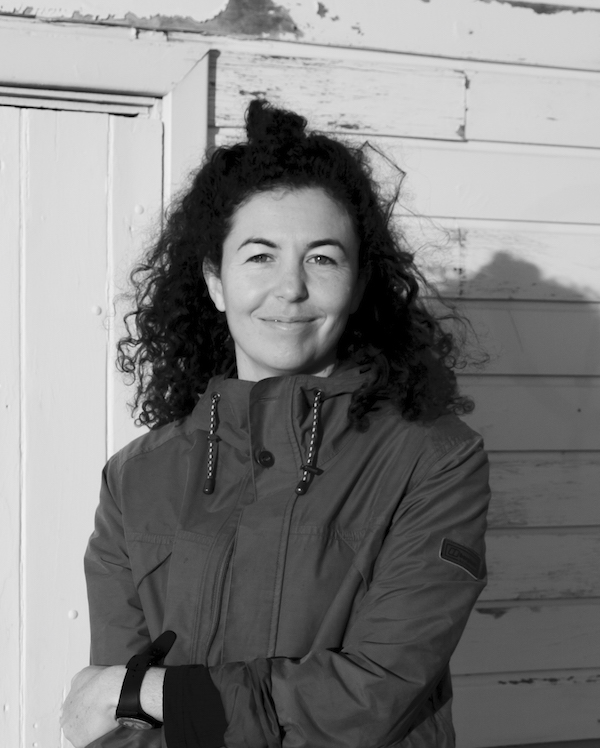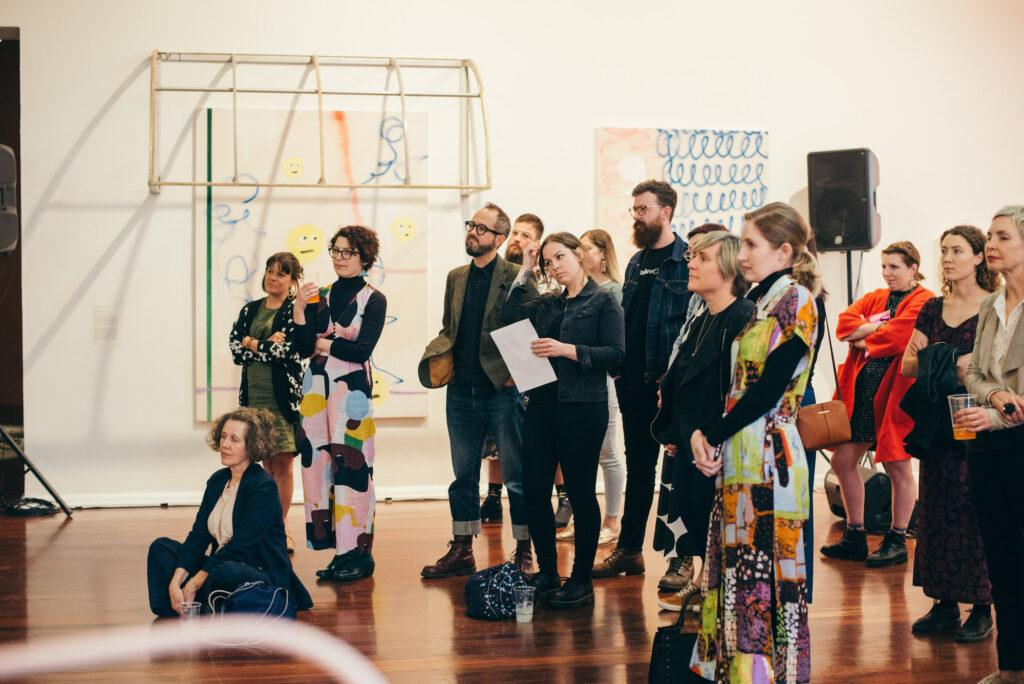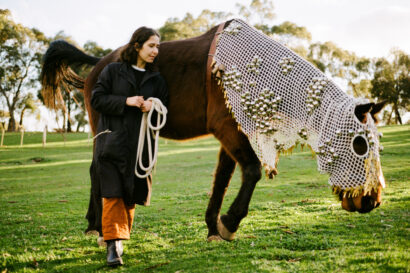What do you say to recent fine arts graduates when the outlook for the arts and for humanities education appears to be so bleak? Artist Tanya Lee found the words at the closing event for PICA’s ‘Hatched 2020 National Graduate Show’.
Redefining the meaning of success
20 October 2020
- Reading time • 10 minutesVisual Art
More like this
- A walk with Tina Stefanou
- A blaze of glorious people
- Diving into the gothic world of Erin Coates
PICA’s ‘Hatched: National Graduate Show 2020’ closed with Night School, an ‘informal rally’ that celebrated the value of arts and humanities education, held on Friday 9 October, 2020. Attended by an audience of emerging artists and their family and friends, artists and supporters, the event included and three speeches by practising artists.
Seesaw is pleased to present the transcript of artist Tanya Lee’s speech.

My name is Tanya. I’m grateful to be standing on Whadjak Noongar country. Recently I’ve been living and working up on Yawru country, which I’ll talk about some more in a moment.
It’s roughly 10 years since I graduated Curtin University here in Perth. After art school, when the instant fame and fortune that I had planned did not come along, I applied for, and luckily, got a job as an art technician at one of the private high schools in Perth.
I quickly found that I really liked it. I liked working in education, and working with kids was fun as they are hilarious. Plus I actually got paid to work with art materials every day, even though a lot of the job involved cleaning sinks and paintbrushes and other important, highly skilled duties of a similar kind.
But one of the main reasons it was great was because I could access the high school art-rooms and materials. I could use the printing press and the paints. I had space to spread things out. The school let me use the paper and the ink, and the clay and the kiln. I’d stay back after work for hours whilst the rooms were empty to use the materials.
It was almost like I had a secret addiction that I had to hide from my teacher-colleagues.
One day, in my first year of the job, I was hanging up a small exhibition of year 10 self-portraits in the drama foyer. A student’s parents walked in, wanting to see their daughter’s work. When I remarked that their daughter’s painting was really good, they responded:
“She is always making art, we’re really worried about her.”
“What do you mean?” I asked.
“We want her to study maths and sciences,” they told me. “We want her to have a successful career and go to uni.”
“But she can study art at uni,” I said excitedly, “I did and it was great!”
“And what do you do with that degree now?”, the student’s mother shot back at me quickly.
“I work here as an art technician!”
They looked at me in awkward silence and, while they were not unkind in any way, it was clear that I did not epitomise the life of success or wealth that they aspired to for their daughter.
To defend them, and to stop this story being about class, it’s not their fault that they wanted their daughter to have agency and choice and safety and access. In fact it’s admirable. Unfortunately we live in a world where these things are a privilege, even though they should be a basic right. They are not things that everyone has. My parents’ sentiments had been similar when I went to study art.

I worked at that school for about nine years. While I had that job I was able to sustain a small but successful art practice, I had a solo show at Fremantle art Centre, showed at Lawrence Wilson Art Gallery, ACCA (Australian Centre for Contemporary Art) in Melbourne and even had work at Dark MoFo festival in Tassie. So I was lucky and I worked at the school for a really long time because it could sustain me.
I’ve continued to work in education and last year I got asked to go back and do some lecturing at Curtin. I was super nervous but also really excited to get to work at a place where I myself had a really good time as a student.
What surprised me was how many students in my second year sculpture unit were studying part-time. They often would tell me a week in advance that they would need to miss a class because they had been scheduled on for a shift at work. I felt bad that they had to do this.
When I queried my unit coordinator about it he just commented that things had changed since I was at uni and many students couldn’t afford to study full-time, pay rent and run a car, so part-time study while holding down a casual job was the only solution.
I grew up with the belief that that everyone in our country has an equal right to education, but now I’m not so sure.
I grew up with the belief that that everyone in our country has an equal right to education, but now I’m not so sure.
For example 44% of high school students in Western Australia are actually paying for private education right now, so yes, there is a right to education, BUT if you pay more money you might be able to get a “better” or at least “better resourced” education.
Or we have equal rights to education BUT not everyone can afford tertiary, full-time study with youth allowance and Abstudy falling short of the cost of living, so for some people it takes longer.
And most recently and very importantly right now, yes everyone can access education BUT it will be cheaper if you study the “right” things…
The Morrison government’s proposed changes to fees for humanities students are essentially financially pressganging its citizens into jobs and industries that serve its own economic goals.
This is not to diminish the importance of science and technology in today’s world. Between COVID19, the bushfires, animal extinction and the climate crisis, STEM subjects are essential. I would love to believe that the government is investing into these areas for reasons like rescuing our ecosystems, inventing renewable energy sources, or having better medical care. But I think the reason for this shift is predominantly about making more money.
At a loose end after COVID lockdowns, and some cancelled and postponed projects this year I decided to go and visit some family up in Broome for a kind of casual, self-directed residency with my second cousin who is a practising artist. She is 83 years old.
My cousin’s name is Angela Bakker – she has absolutely no interest in the internet, and when she works with a curator, they are of a similar vintage to her, so you probably wont find much about her online.
Angela is amazing. She trained as a production potter in the UK in the 1960s, a time when there were not many women at art school.
She digs her own clay out of the desert, builds her own kilns and makes many of her own clay tools, not necessarily because its cheaper but often because its better quality.
She wakes up at 6 and is in the studio by 7:30 every morning. She often works until 7 or 8 at night. She frequently tells me that she has so much art to make before she dies, a comment that is both funny and devastating.
Her deadline is the ultimate deadline, and it’s real. It makes me feel guilty, as sometimes I only make art when I feel in the mood or I feel good about my life.
Working with her over the last few months has made me think about the sustainability of having an artistic practice. I really hope that I’m still getting to make art at age 83 and that I have the resources, health and agency to do it.
To really embrace sustainability is to let go of ideas of success, wining and wealth. I mean this in an environmental and economical sense but also on a personal level, where perhaps if we stop trying to be individually “the best”, we can be collectively more. Include more voices, be more dynamic and understand more about the world.
So for those of you here tonight who are new graduates I wish you not “every success” but instead “good sustainability” for your future, practices and lives.
This transcript was first published on the PICA website and is published here with kind permission from Tanya Lee and PICA.
Read Jaimi Wright’s review of ‘Hatched 2020 National Graduate Show’.
Pictured top is Tanya Lee, speaking at ‘Night School’. Photo: Tasha Faye
Like what you're reading? Support Seesaw.






